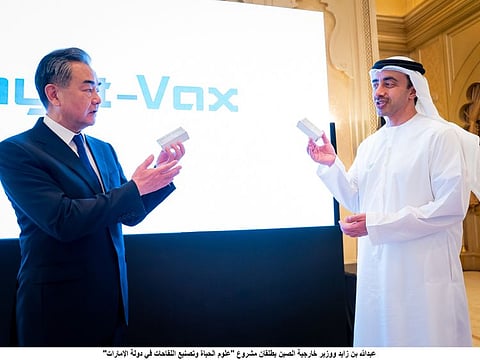Next phase of COVID-19 pandemic presents greatest logistical challenge facing mankind – Sheikh Abdullah
Gap between vaccine delivery in rich and poor countries is growing every day: WHO

Abu Dhabi: The next phase of the pandemic is essentially the greatest logistical challenge for mankind thus far.
This critical phase of ending the pandemic therefore requires cooperation and shared commitment, Sheikh Abdullah bin Zayed Al Nahyan, UAE Minister of Foreign Affairs and International Cooperation, said in the capital on Monday.
He was speaking at the World Immunisation and Logistics Summit, organised by the Hope Consortium, where top health officials are discussing the global and equitable distribution of COVID-19 vaccines across the world.
Growing gap
World Health Organisation’s (WHO) director general, Dr Tedros Adhanom Ghebreyesus, warned at the Summit that the gap between the number of vaccines administered in rich countries and poor countries is growing every day. “[But] the inequitable distribution of vaccines is not just a moral outrage; it is economically and epidemiologically self-defeating,” the WHO chief warned. He also called for greater vaccination efforts, highlighting that the higher the chance of COVID-19 transmission, the more the chance that newer variants of the infectious coronavirus will emerge.
Risks of greater transmission
“The more transmission, the more variants. And the more variants that emerge, the more likely it is that they will evade vaccines. As long as the virus continues to circulate anywhere, people will continue to die,” Dr Tedros explained.
The director-general therefore welcomed the Hope Consortium, a public-private partnership led by Abu Dhabi that aims to provide vaccine access and distribution, to the WHO’s COVID-19 Vaccine Global Access (Covax) efforts. “Ultimately it’s not vaccines that save lives, it’s vaccinations. The scale of what’s needed in terms of the number of vaccinators, engagement with communities and ongoing monitoring, and health system strengthening is truly unprecedented. We can only meet this challenge together with a coordinated, consistent and coherent approach. Ultimately ending the pandemic is not just a test of science. It is a test of character,” Dr Tedros added.
UAE vaccine production
Ahead of the summit, UAE also launched a new effort to support vaccine availability. Sheikh Abdullah and his Chinese counterpart, Wang Yi, China’s Foreign Minister, launched a joint project on Sunday to produce the Sinopharm vaccine in Abu Dhabi. The Life Sciences and Vaccine Manufacturing in the UAE initiative will therefore locally produce the inactivated vaccine that underwent Phase III trials in the UAE, with the product being called Hayat-Vax.
The UAE has also successfully vaccinated more than half of its adult population against COVID-19 so far, including more than 70 per cent of the elderly and residents with chronic diseases. According to the UAE Ministry of Health and Prevention, more than eight million doses of COVID-19 vaccines have been administered in the country.
UAE’s efforts to end pandemic
Marz Suzman, chief executive officer at the Bill and Melinda Gates Foundation, also commended the UAE’s efforts to fight COVID-19 fight on the global stage. He highlighted how the Abu Dhabi-headquartered Global Institute for Disease Elimination – a collaboration between the Bill and Melinda Gates Foundation and His Highness Sheikh Mohamed bin Zayed Al Nahyan, Crown Prince of Abu Dhabi and Deputy Supreme Commander of the UAE Armed Forces – is playing a role in combatting COVID-19, inclu addition to its efforts against malaria, polio and neglected infectiour diseases.
“The UAE has continued to play its part [since the start of the COVID-19 outbreak]. You rightly focussed on protecting not only your own people but also people in other countries, because you understand that ending the pandemic means ending the disease everywhere. The UAE [has in fact] provided COVID-19 assistance of one kind or another to 70 countries,” Suzman said.
Now, with the Hope Consortium, Abu Dhabi is aiming to provide 18 billion doses of the COVID-19 vaccine around the world. The Consortium boasts the leadership of the Abu Dhabi Department of Health, and the support of Abu Dhabi Ports, Etihad Airways’ cargo division - Etihad Cargo, procurement provider Rafed, container solutions provider SkyCell and digital solutions provider, Maqta Gateway.
Benefits of cooperation
Suzman highlighted the benefits of supporting other countries in their COVID-19 efforts. “A conservative model has shown that by supporting the 92 least wealthy countries at a cost of $38 billion (Dh139.5 billion), just 10 high-income countries, including the UAE, will generate $466 billion (Dh1.711 trillion) for their own economies by 2025. That is a 12 times return on investment,” Suzman said.
He also referred to the UAE a pioneer for convening the summit to think pragmatically about vaccine distribution and access. “By themselves, initiatives like Covax seem like they cost a lot of money, but it is not just an act of generosity. It is an act of self-preservation too,” he said.








